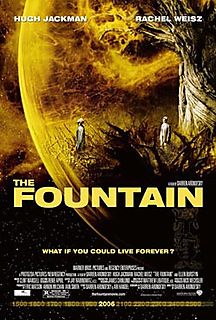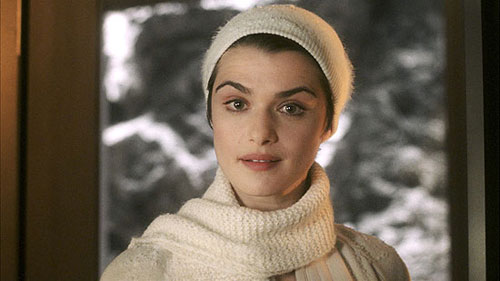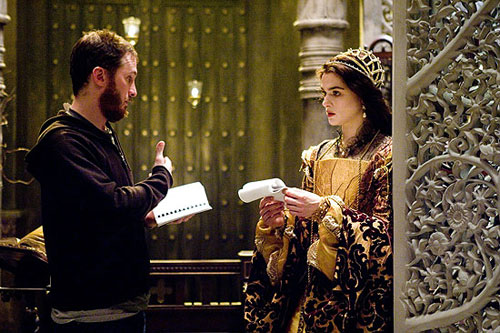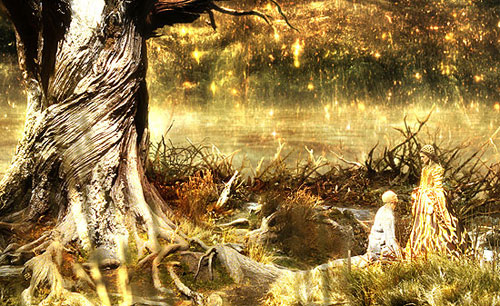 Rachel Weisz is gorgeous. Some movie stars don’t hold up when you meet them in real life, but Weisz is the real deal when it comes to beauty. But what makes Weisz one of the few actors worth actually talking to is the fact that she’s a damn brilliant actress who deserves every ounce of the Oscar she won last year for The Constant Gardener.
Rachel Weisz is gorgeous. Some movie stars don’t hold up when you meet them in real life, but Weisz is the real deal when it comes to beauty. But what makes Weisz one of the few actors worth actually talking to is the fact that she’s a damn brilliant actress who deserves every ounce of the Oscar she won last year for The Constant Gardener.
It’s interesting – her role in that movie could be see as analogous to her role in fiancée Darren Aronofsky’s The Fountain. In both she’s the impetus behind the frenzied quests of driven, possibly doomed men. In both she has a minimal amount of screen time to create a maximum amount of impact. In both she’s fantastic.
Q: Darren has said that he was reluctant to cast you in this film because of your relationship.
Weisz: It was Hugh’s idea!
Q: Were you equally reluctant?
Weisz: No. I really wanted to do it, but I never said. I didn’t bring it up. But Darren’s one of the greatest film directors around.
Q: How was it working with him?
Weisz: Who we are in our work lives and who we are in our personal lives is quite different. I met the director and he met the actress. They’re different parts of our identities.
It definitely exceeded my expectations, it was a real collaboration. He really pushes his actors – pushes you, pushes you, challenges you. That’s what you want as an actor, to be challenged, to be pushed to the edge and out of your comfort zone, where you’re very raw and exposed – all of that actory stuff that we love. It was a great experience.

Q: Does being raw and vulnerable come easy to you?
Weisz: I can go to those places, but it definitely helps if you’re supported and challenged and sometimes pushed there.
Q: Do you think that women can deal with tragedy better than men?
Weisz: I don’t know the answer to that. I will say that in The Fountain the woman is wiser than the man. I guess it’s quite the male thing to try to fix things and chase the answer, while the woman has surrendered to the divine logic of things and wants to celebrate the last few moments she has with her husband.
Q: Was it hard for you to cut your hair so short?
Weisz: Darren was really clear that whoever played that part, because the character had lost her hair to chemo and it was growing back in in an uneven way, that he wanted the actress to not have a wig. Most actresses these days have really long hair, so he wanted to make that clear. I think he saw it as an important part of the transformation that character went through. I thought it was kind of cool. It definitely had a starkness to it, and it told a lot of story without me working to tell that part of the story. We shot the present first and then we shot the past, so in the past I had a wig. I had a fabulous queen’s wig.
Q: One of the things that’s unique about The Fountain is that it’s a film that celebrates coming to terms with death – we don’t see that often in Western film, which is about fighting against death. You play a character who has come to accept her mortality – what is your relationship to mortality.
That’s such a downer of a question.
Weisz: No, because the downer and the upper are the same thing because the movie really is about death and all the things you just said, but to me it’s really about the celebration of life. The whole movie to me is about the moment where I go to Hugh Jackman and say, ‘Will you come take a walk with me and see the first snow?’ and he says, ‘I’m too busy, leave me alone.’ I think every couple on Earth has had a tiff with their partner about something like that. I think the idea is that on our death bed, that’s the moment we’re going to regret, that we didn’t spend enough time with our loved ones; we didn’t seize the moment and smell the roses, all those expressions. We didn’t live as fully and openly and presently and lovingly with those around us as we could have. To me, that’s what the movie means.

I don’t know what I think about death or the afterlife, but I do know that life is finite and short, so we have to celebrate being alive.
It didn’t make me think about death or growing old, or the depressing things, but about life. The fact that we do die means we have to live fully. This doesn’t carry on forever, so we have to try to live fully. There’s this English poet John Betjeman – he’s dead now – who said on our death beds we’re not going to regret all the work we didn’t do but all the sex we didn’t have. That’s a silly thing… well, not that silly, I guess! But it’s about living.
Q: You went to hospices to prepare for this role. How did that affect you?
Weisz:
Hospitals are places we go and doctors try to save our lives, they
operate and medicate. Hospices, people go there when there’s nothing
else medicine can do for them anymore. The most inspiring thing was
meeting people who work there – what they did every day was get up and
go to work to help people die. It’s the most mind-boggling job, but
such an important one, and a brave one. Their perspective on death,
because it was a daily occurance, what they were trying to help happen
with grace and dignity… to hold people as they were dying, or play
music, whatever these people wanted. The people who worked there were
very inspiring.
Q: Were the patients at the hospice receptive?
Weisz:
Some were, some weren’t. The people who didn’t want to talk to me I
wasn’t introduced to. The people who worked there told me which people
would be willing to talk to me. Everyone is different, I guess.
Q:
One of the most challenging things about Izzy is that the only time we
ever see her healthy is in a brief flashback where she’s running. But
you and Hugh have this relationship that makes us feel like we know
these characters not just at the end of life, but as whole people. How
did you guys capture that – how did you make Izzy not just a sick
person, but a complete person?
Weisz: Thank
you. I’m glad you saw it like that. We rehearsed. We had a couple of
weeks rehearsal with Darren. He’s a real performance director; he’s not
just a visual genius and stylist. He’s a real performance director, so
just like if we did a play we made up a back story about how we met, we
improvised the moment when I was first diagnosed. We had a history of
improvisations and dialogues we had done together that filled out
ourselves.
Q: Last year you had this whirlwind leading up to the Oscars, all the wins. Does that change things for you or is it just a moment?
Weisz: Obviously it’s a tremendous thing to receive that level of respect from your community. Clooney said at the Oscars, ‘My obituary will read: “George Clooney, Actor, Oscar Winner, Batman, Dies in Tragic Car Crash”.’

But I just want to carry on working, carry on exploring. Has it changed things? I don’t know. It’s a tremendous honor.
Q: Where is the Oscar?
Weisz: In my sitting room.
Q: How does being a mother change your outlook on this career?
Weisz: Gosh, being a mum… I’m a mum now! A whole new part of myself has come alive that I didn’t know was there. You don’t read a book, you just become one. It’s changed my perspective on a million things. As for work – you know, there are a lot of working mothers in this world. Many who don’t have a choice, they have to go back to work to earn money. But it’s definitely a balancing act, and I have a huge amount of respect for working mums now that I’ve joined that club.
Q: And what are you doing next?
Weisz: A film called The Brothers Bloom.
Q: With Rian Johnson! Rian’s so great.
Weisz: Isn’t he cool? He’s very cool! I love Brick.